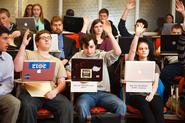
In an attempt to derail the 1957 civil rights act, Senator Strom Thurmond spoke to Congress for a record 24 hours and 18 minutes, touching on subjects that had nothing to do with the bill at hand. The length of this speech, the longest filibuster in American history, is of course highly unusual, but it highlights the frustration and tedious work that goes into a political career.
Students enrolled in government 219 and 221, both taught by Visiting Instructor of Government Andy Milstein, got a feel for such slow-moving and hard-earned developments during a weeks-long simulation of the legislative process. The experiment ended in a meeting to present and vote on the bills that the students designed.
The students of the two classes, Congress and the Legislative Process (219) and The American Presidency (221), were assigned positions on two Senate committees and as members of various lobbying firms, the executive branch and the media. These groups interacted with each other to offer imaginary funds, negotiate compromises and release publications. Each sector, as well as each individual, had to stand by an assigned agenda that corresponds to the real-life political system. Peter Adelfio ’13, led the meeting during his portrayal of Harry Reid, the Majority Leader. The group went through 44 bills that students drafted.
Some non-controversial bills passed quickly and almost unanimously, such as the Seniors Tax Simplification Act. Others resulted in filibusters, or delays, some that lasted nearly an hour. Students read from dense textbooks, booklets of pickup lines and Dracula while their party got the chance to delay, and possibly renegotiate, the bill at hand. While discussing their Social Security Reform Act, Republicans vehemently opposed the proposed tax increase on people earning over $250,000 annually.
President Obama, portrayed by Tim Driscoll ’14, proposed that if the bill passes as is, the Democrats would agree to pass a later bill that would raise the minimum age to receive Social Security to 68 by 2069. Ultimately, the negotiation between the Democrats and Republicans secured this promise, plus certain amendments to the Social Security Reform Act.
While Milstein has never attempted such a simulation at Hamilton, he said that these experiments have been highly successful at other schools where he taught. For the project, he combined two classes in order to meet the minimum number of people needed for a successful simulation. While it involves a lot of hard work, research, and a willingness to stay up into the morning hours during the final meeting, Milstein explained that the simulation has benefits that lectures cannot provide. While lectures and readings can relate information, this particular project offers a unique, hands-on learning experience that is somewhat realistic, undeniably memorable, and even fun.
Milstein’s students seem to agree with his take on this approach. For two international students in the class, the simulation brings to life a system that they could not have otherwise understood so thoroughly. For example, Jamie Monteith-Mann, who will begin his freshman year at the University of York next year, said that while he had studied the American political system before, he didn’t really understand how filibusters work until he saw it come to life over the course of the simulation. He explained that it helped him “realize how powerful the minority is in America.” During his portrayal of Republican Senator Chuck Grassley, he also came to understand the views of the right wing better than he had previously.
Baptiste Gachet, a law student at Sciences Po in France who portrayed the Secretary of Commerce, described the simulation as “crazy” in that it reflects the very different politics between the United States and France. He found the high levels of partisanship in the United States to be highly interesting from a foreign perspective, noting that, after his observations from government 219, he does not believe that the U.S. system is sustainable. The class taught him a great deal about the campaign donation practices and the influence of lobbyists in the United States, which plays a much lesser role in France.
Some of Milstein’s previous students who have gone on to work in political offices, have told him that, despite the stylized, micro-version of Congress that the simulation represents, it bears a strong resemblance to real-world political proceedings. Clearly, the passion that ignited among students for their respective causes is indicative of the project’s success. Despite the weeks of effort that they put in and the possibility of one very late night, the debate was spirited and the participants indisputably engaged.
Posted November 30, 2011
